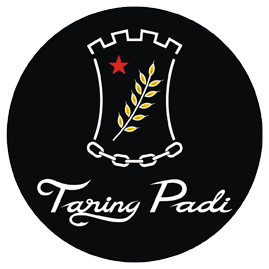
Taring Padi is an art collective based in Yogyakarta Indonesia that uses art as a tool for political expression and education for all.
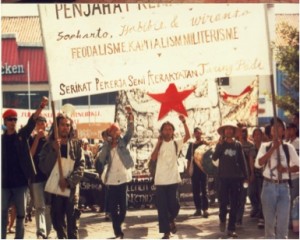 Taring Padi (TP) proclaimed its existence in the political-cultural realm of Yogyakarta, declaring and announcing its mission statement (Preamble) and the “Five Evils of Culture” at the Yogyakarta LBH office on December 21, 1998. As a progressive cultural organization, Taring Padi outlined its mission to revive “People’s Culture,” and to advocate and strategize for a united front supporting democratic and popular change in Indonesia. Taring Padi’s statement was signed by a group of cultural activists, students, artists, and self-taught artists.
Taring Padi (TP) proclaimed its existence in the political-cultural realm of Yogyakarta, declaring and announcing its mission statement (Preamble) and the “Five Evils of Culture” at the Yogyakarta LBH office on December 21, 1998. As a progressive cultural organization, Taring Padi outlined its mission to revive “People’s Culture,” and to advocate and strategize for a united front supporting democratic and popular change in Indonesia. Taring Padi’s statement was signed by a group of cultural activists, students, artists, and self-taught artists.
Taring Padi was conceived of as a cultural activist organization, and positions itself in the middle strata of society. Taring Padi has two roles in cultural activism. On one level, Taring Padi facilitates resistance against “elite discourse” and promotes populist or people’s art, while on a second level, Taring Padi organizes social and cultural organizations with a progressive and middle-class orientation.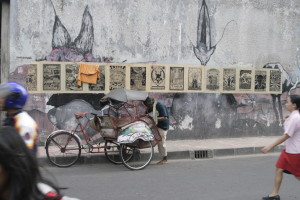
Taring Padi’s Preamble and “Five Evils of Culture” strongly oppose the conception of “Art for Art’s Sake” that has been sustained by both private and state cultural institutions throughout the New Order era. The culture of Indonesia, according to the text of “Five Evils of Culture,” has been chained for capitalist profit, making it vulnerable to neo-imperialism and the power of the international market. Taring Padi understands “democratization” as the freedom to follow one’s own beliefs and principles, with mutual respect, and reflecting the cultural heritage of Indonesia.
The home of Taring Padi in 1998 was a collective place, with the familiar feeling of one’s hometown or place of birth. Taring Padi House, located in Gampingan on the former ASRI campus (now the Arts Institute of Indonesia), has now become the building for the Jogja National Museum (JNM). From the time Taring Padi occupied the building, it became a stronghold for progressive and revolutionary activities; the house’s lecture rooms w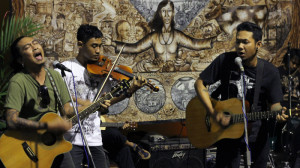 ere used by Taring Padi to facilitate gatherings and exhibitions, as well as “borrowed” by other progressive groups for discussions, concerts, and performances. In addition, Taring Padi encouraged the participation of local residents. Taring Padi members gave drawing lessons to neighborhood children, and held “Full Moon” culture night activities where local residents were invited to perform music and recite poetry. Taring Padi has been involved in other local cultural activities, weddings, and keroncong [a genre of music] performances. Several members of Taring Padi have joined the dangdut [a genre of music] groups “Soekar Madjoe” and “Dangdut Kampungan” (DK), groups that perform songs that speak to the condition of the local people, appearing at campus performances and in the area at large, both in Yogyakarta and in neighboring cities.
ere used by Taring Padi to facilitate gatherings and exhibitions, as well as “borrowed” by other progressive groups for discussions, concerts, and performances. In addition, Taring Padi encouraged the participation of local residents. Taring Padi members gave drawing lessons to neighborhood children, and held “Full Moon” culture night activities where local residents were invited to perform music and recite poetry. Taring Padi has been involved in other local cultural activities, weddings, and keroncong [a genre of music] performances. Several members of Taring Padi have joined the dangdut [a genre of music] groups “Soekar Madjoe” and “Dangdut Kampungan” (DK), groups that perform songs that speak to the condition of the local people, appearing at campus performances and in the area at large, both in Yogyakarta and in neighboring cities.
Taring Padi applies an open membership system, along with the requirement of commitment to populist goals. The artists of Taring Padi come from a variety of educational backgrounds. Some members are highly educated, others have dropped out of school, and some are still engaged in study in a variety of disciplines. Taring Padi members without previous arts experience study informally, alone or in groups, and join discussions organized and facilitated by Taring Padi on a variety of national and international 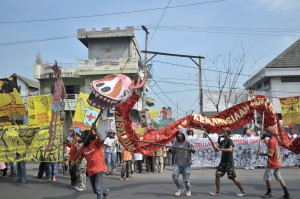 topics.
topics.
Taring Padi’s collective approach to art production is one part of a larger effort to overcome bourgeois ideas of the “artist genius” and the “work of art.” The artwork produced by Taring Padi is not credited to an “individual” creator. Most Taring Padi works are created collectively and can be divided into four categories: billboards or banners, posters, puppets and popular booklets titled “Terompet Rakyat” (The People’s Trumpet).
Furthermore, this collective production of artwork does not preclude the production of individual art. Although the text of the “Five Evils of Culture” states an opposition to individualist artwork, this policy goal is related to the capitalist mode of production that mediates individual creative production, artwork, and the market. Taring Padi holds that the concept of individual needs must be considered in a democratic context, where individuals have responsibilities to their communities.
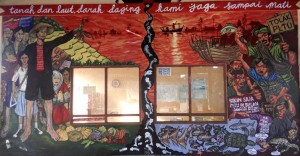 Taring Padi receives profits from its members from the production of small-scale and informally traded artwork, including paintings, posters, drawings, comics, stickers, t-shirts, emblems, pins and illustrations for books with ideological inclinations in line with their own. Another source of funding comes from one-time donations, many through connections and friendships with those connected to “elite discourse” (the bourgeoisie). It must be noted that Taring Padi clearly differentiates between individual artwork and artwork that is made for the purposes of the collective. This duality is evident in the fact that groups and individual artists are free to make their own artistic choices. The collective artwork of Taring Padi is made under strict regulations regarding how different works are to be used, to be shown or to be sold to raise collective funds. The original works of TP, such as the banners and puppets, must not be sold. These works are treated as tools created in the service of public education campaigns and can be used by social movements that will benefit from their use. Works that are easily reproduced are sold by Taring Padi. This includes works such as posters and banners, stickers, pins, and t-shirts, all of which are used as merchandise for raising funds.
Taring Padi receives profits from its members from the production of small-scale and informally traded artwork, including paintings, posters, drawings, comics, stickers, t-shirts, emblems, pins and illustrations for books with ideological inclinations in line with their own. Another source of funding comes from one-time donations, many through connections and friendships with those connected to “elite discourse” (the bourgeoisie). It must be noted that Taring Padi clearly differentiates between individual artwork and artwork that is made for the purposes of the collective. This duality is evident in the fact that groups and individual artists are free to make their own artistic choices. The collective artwork of Taring Padi is made under strict regulations regarding how different works are to be used, to be shown or to be sold to raise collective funds. The original works of TP, such as the banners and puppets, must not be sold. These works are treated as tools created in the service of public education campaigns and can be used by social movements that will benefit from their use. Works that are easily reproduced are sold by Taring Padi. This includes works such as posters and banners, stickers, pins, and t-shirts, all of which are used as merchandise for raising funds.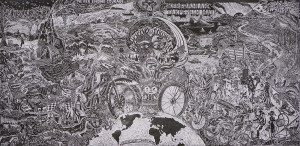
During the art market boom from 2001-2008, before the financial crisis hit Indonesia, Taring Padi continued to follow this sales system for their “original” artwork for community and campaign needs. This boom in the art market had a considerable impact on the art scene in Yogyakarta. Many artists in the city changed artistic direction, increasing the scale of their work and switching to creating two-dimensional work on canvas, so that it would be easier to sell. At the same time, Taring Padi, in spite of the market for “authentic work,” never changed their policy of not selling billboards and large-scale artwork. This may have seemed counter-intuitive; however, this is an approach that is firmly established and must be continued for the preservation and sustainability of the people’s art of Taring Padi.
Five Evils of Culture, “Taring Padi” People’s Cultural Institute (1999)
- Institutes of art and culture that emphasize art for art’s sake, individualist and opportunist groups that socialize misguided doctrines with the goal of preserving the status quo and for the sake of estranging the people from the development of art, and that divide the people into groups for economic/ material purposes (upper/lower/middle classes).
- Governments/leaders, via departments that manage art and culture, that support the status quo and seek to shape Indonesian culture only to be sold for its exoticness in the interest of economy and power.
- Institutes of culture that enable institutions as legitimators of artists and artwork, and determine the direction of development in art.
- A system that destroys art workers’ morality through working only for individual interests without thought of community interests, even exploiting the suffering of the people for the sake of individual profit.
- Lack of understanding about the function of art in society resulting from New Order politics that emphasize “Economics in Command,” along with the tactics of Collusion, Corruption and Nepotism.
Mission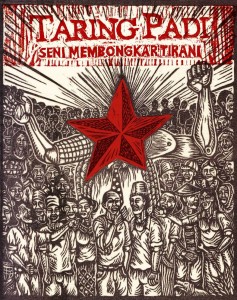
Taring Padi Cultural Institute seeks to foster art and culture by channeling the people’s desires and needs and prioritizing openness, social prosperity, the sovereignty of the people, justice between generations, democracy, the appreciation of human rights without dismissing responsibilities, gender perspectives, the reformation of global relations and the preservation of a good environment.
Vision
The people’s cultural institute Taring Padi seeks to play the following roles:
First, as a forum for artists supporting all parties in the cultivation of local art and culture with a populist orientation, emerging from the needs of the people and the private, social, and democratic development of the people.
Second, as a forum for artists to play an optimal role in supporting change as well as, (among others):
Developing the transformative potential of art by providing solutions to the problems, needs, and desires of the people with the artwork that is created.
Deconstructing hegemonic national symbols that weaken the abilities of the people and control policies for the development of art and culture.
Prompting changes in the understanding of art, in order to address the desires, needs, and aspirations of the people in all things.
Third, as an art workers’ forum for communication, exchange of experience and information as well as a place for strengthening cooperative ties in accordance with the vision, mission, and institutional goals of the people’s cultural institute of Taring Padi.
Sources Cited
Arbukle, Heidi. “Taring Padi: Praktik Budaya Radikal di Indonesia” (“Taring Padi: Practicing Radical Culture in Yogyakarta”). Yogyakarta: LKiS, 2010.
Arsip dan Dokumentasi (Archives and Documents). Taring Padi. Yogyakarta, 1998 – 2011.
Pos ini tersedia di bahasa: Indonesian